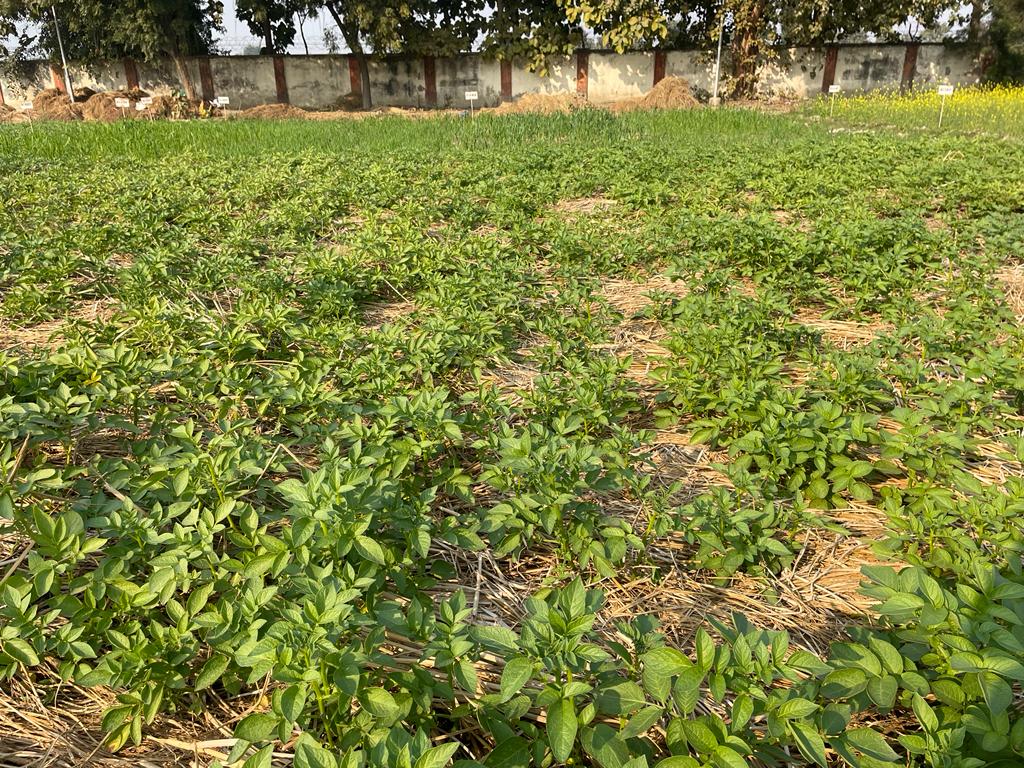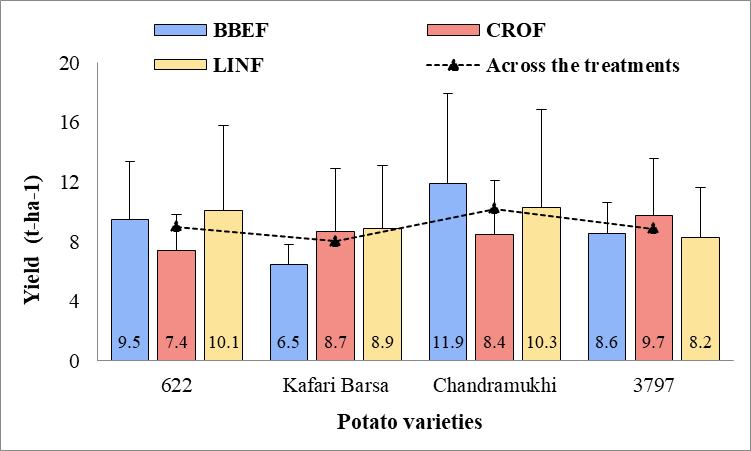In India, potato is the most important food crop after rice, wheat, and maize. Reduced-tillage potato cultivation is a sustainable and effective technique for organic farming that offers numerous benefits to farmers and the environment, particularly soil health and chemical-free farming.

On-farm demonstration trials using organic reduced tillage and rice straw mulching for potato crops at the ISARC experimental field in Varanasi. (Photo: ISARC)
.
In India, potato is the most important food crop after rice, wheat, and maize. Farmers have been cultivating potato crops for more than three centuries across the entire country. Himachal Pradesh, Punjab, Uttar Pradesh, Madhya Pradesh, Gujarat, Maharashtra, Karnataka, West Bengal, Bihar, and Assam are the major potato-growing states in India.
Changing climate patterns and other environmental concerns have initiated the need for sustainable solutions such as organic farming. Organic farming not only involves the use of natural resources in an efficient manner but also results in better crop yield and soil health.
Reduced-tillage potato cultivation is a sustainable and effective technique for organic farming that offers numerous benefits to farmers and the environment, particularly soil health and chemical-free farming.

Potato crops cultivated using the reduced-tillage method at the ISARC e[erimental field. (Photo: ISARC)
This farming technique involves planting potatoes without tilling the soil or using traditional plowing methods. Instead, after harvesting their rice crop, farmers use strip tillage to sow potato seed after without disturbing the soil structure and the natural habitat of microorganisms. The potato seeds are mulched with rice straw and manure.
There are numerous benefits to reduced-tillage potato cultivation. It helps maintain the soil’s health. By reducing soil disturbance, farmers can preserve the soil structure, which prevents erosion and helps to maintain the natural balance of nutrients and microorganisms in the soil. By maintaining the natural structure of the soil, farmers can provide the ideal conditions for the growth of the potato crop.
Reduced-tillage potato cultivation requires less labor, fuel, and equipment than traditional plowing methods. This results in cost savings for farmers without sacrificing yields.
Studies have shown that, compared to the traditional ridge and furrow method, reduced-tillage potato cultivation produces higher, net returns, and a benefits-cost ratio.
Reduced-tillage potato cultivation reduces the ecological impact of potato farming. Farmers can reduce the fuel and fertilizer needed by reducing the need for plowing and reducing greenhouse gas emissions and other pollutants.
The International Rice Research Institute South Asia Regional Center (ISARC) in Varanasi, Uttar Pradesh, is conducting an experiment to evaluate different natural farming systems to develop a standard package of practices. Researchers at ISARC are studying different crops and varieties suitable for low-input of biochar-based ecological farming (BBEF), climate-resilient organic farming (CROF), and low-cost natural farming (LINF).

Across the treatment, the figure shows the potato yield (t/ha) under natural farming and reduced-tillage farming practices
.
For potato cultivation, ISARC is evaluating the 622, Kufri-badshah, Chandramukhi, and 3797 varieties. The result suggests that Chandramukhi yields better than the other potato varieties across farming practices.
By adopting reduced-tillage potato cultivation, farmers can improve their yields, reduce the cost of cultivation-use efficiency, and maintain soil health. However, further research is needed to validate the findings in different agroecosystems to further customize the technique.
Related stories:
Conservation agriculture for rice-based intensive cropping by smallholders in the Eastern Gangetic Plain
In a recent review paper on the practice of conservation agriculture (i.e., minimum mechanical soil disturbance, organic soil cover, and crop species diversification) by smallholders, the authors concluded that it was an approach that could improve soil health, decrease costs of production and increase crop profitability. The present paper outlines the development of a form of conservation agriculture suited to rice-based cropping in small farms of the Eastern Gangetic Plain with particular reference to Bangladesh.
Understanding soil health management under different land uses
Soil is one of the planet’s great reservoirs of vast biodiversity. It provides a habitat for plants, animals, and microorganisms and acts as a buffer against pollutants that safeguards the purity of groundwater. Additionally, because of the massive amounts of carbon, it collects and stores, the soil is essential in combating climate change and mitigating its impacts. Thus, food security is only attainable with healthy soils. However, anthropogenic activities are endangering and deteriorating grounds all around the world. As Franklin D. Roosevelt once said, “The nation that destroys its soil, destroys itself.”
Resource conservation technology for sustainable productivity of intensive rice-based cropping pattern in Bangladesh
Resource-conserving technology is a novel crop management approach for intensive rice-based cropping systems in Bangladesh. The study concluded that strip tillage, integrated with effective herbicides and residue mulching, was a profitable alternative to manual weeding in conventional tillage.







